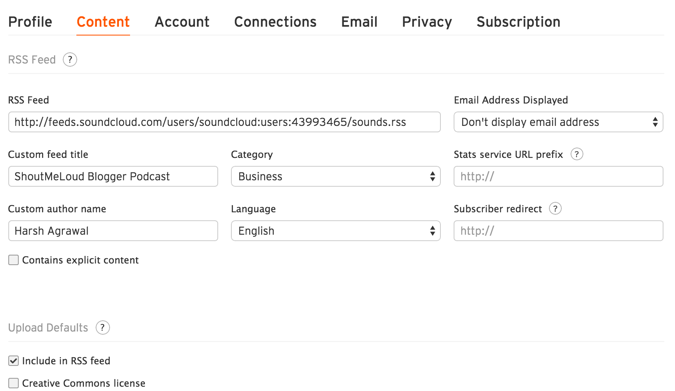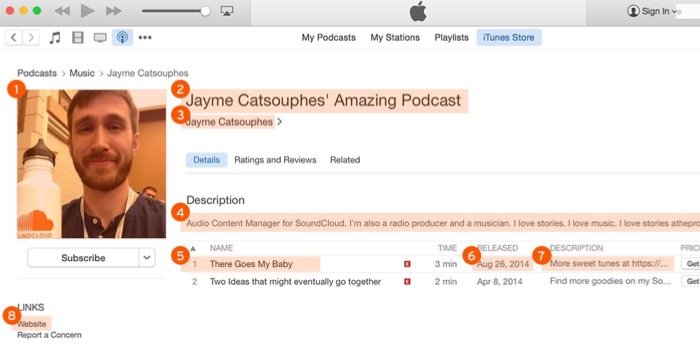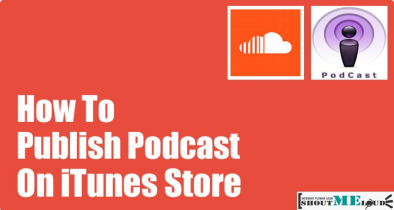The iTunes podcast directory is a great place to start a podcast channel.
Even if you’re not a tech whiz, following the steps in this guide will make publishing your audio podcast a breeze.
Musicians are familiar with SoundCloud’s brand. The first time I used it, I utilized it primarily to listen to obscure and unheard-of songs.
A podcast hosting site is now available on SoundCloud, which used to be recognized exclusively as a platform for musicians.
SoundCloud
This is a great way for musicians to get their music into the iTunes store.
It’s also possible to start your own podcast channel on SoundCloud!
One of the best things about this possibility is that you can use the free plan for an unlimited amount of time before you need to upgrade to the “Pro” plan..
Podcasting is a great way for bloggers who don’t want to pay money on a podcast hosting service to get their own show up and running.
Using SoundCloud to get your podcast into the iTunes store.
Get started by signing up for a free SoundCloud account at the site’s homepage. If you are already a SoundCloud user, all you need to do is log in to your account.
In order to begin creating a podcast, go to the settings page. In this section, you’ll make a few basic adjustments.
[rb_related title=”More Read” style=”light” total=”4″]
1. Make a profile picture a part of your account. At a minimum, your image should be 1400 x 1400 pixels in size. To be used in the iTunes Store, this image will be utilized.
2. Describe your podcast, include connections to your website, and anything else that’s required.
3. The “Content” tab can be found here. The RSS feed for your podcast may be found here. Again, be sure to provide all pertinent information.

Now is the time to put up your first podcast!
You can also use sounds that you’ve already posted to your account.
Tracks that you have already uploaded can be added to the RSS feed by clicking on “Edit Track” and selecting “Permissions” under the “Subscribers” tab.
SoundCloud data will appear in the iTunes store as follows (be sure to optimize the details for iTunes!):

Inferred from the picture:
1. The image for your profile on SoundCloud
2. The display name of your SoundCloud account OR the custom feed title
3. Display name on SoundCloud (the default) OR your own custom author name
4. SoundCloud profile description
5. the name of the track on SoundCloud
6. the date of the upload to SoundCloud
7. A description of a track on SoundCloud
8. The URL of your SoundCloud profile (which is the default) OR the website you have listed under “You on the web” in the settings
The Step-by-Step Guide to Adding Your Podcast to iTunes via SoundCloud
After you have finished configuring all of the parameters that were discussed above, you are now prepared to upload your podcast to the iTunes store.
Your SoundCloud RSS feed address may be found by going to your settings, clicking “Content,” and then selecting it.
Note: FeedBurner is the tool you need to use to burn your feed. If you do things this way, you won’t have any issues even if you decide to move your podcast hosting from SoundCloud to another service.

Make use of your Apple ID to sign in to Podcast Connect. Create one if you don’t already have one if you don’t already have one.
Follow the link I’ve provided. It will open the program that you have downloaded from iTunes, where you can then provide your RSS feed.

MORE ARTICLES:
How to Choose a Blog Niche That Will Make Money? (Right way to do it in 2022)
Review of Cryptos Seed: Is it a scam or secured?
Reasons for the Over 16% Drop in Bitcoin Prices on June 14th
Your application will be rejected if the dimensions of the cover art for your podcast fall beyond the range of 1400 pixels by 1400 pixels to 3000 pixels by 3000 pixels. Therefore, you need to ensure that your image complies with the standards set by iTunes. On the following page, choose the sub-category that best fits your podcast, and then submit it.
It will take a few days before your podcast is examined and given the go-ahead to be distributed.
This is the link to my Live Podcast that can be found on the iTunes store:

You are able to embed SoundCloud audio on your blog if you utilize SoundCloud, which enables you to promote all of your podcasts and encourage users to subscribe to the channel for your podcast. On the other hand, from a marketing point of view, it is a smart idea to suggest to users that they subscribe to your podcast address on the iTunes store.
Because of this, you need to make use of one of these WordPress podcast plugins, which will add buttons to enable users to subscribe to your podcast on iTunes, Google Podcasts, and other platforms.
It is important for musicians to link to their profiles on SoundCloud since visitors to that page can save the music for later listening and share it with their friends on social networks.
Important points:
- You need to use FeedBurner to “burn” your SoundCloud feed, and then you should submit that URL. It will be unnecessary for you to worry about the stream in the event that you decide to leave SoundCloud at some point in the future.
- When I initially distributed my podcast through the iTunes store, I did so using the RSS feed URL that is associated with SoundCloud. In the end, I used FeedBurner to publish the feed, and I sent an email to the iTunes support staff asking them to amend the URL of my feed.
- You can use this tutorial as a reference in the event that you decide to switch from your current podcasting host.
So go ahead and create a SoundCloud account to host your audio podcast!
Please don’t hesitate to contact me in the comments area with any inquiries that you might have.
If you think others could benefit from this tutorial, please post it on social networking sites like Facebook, Twitter, and LinkedIn.











Leave a Reply